
Posted on 07/18/2010 5:13:40 AM PDT by Homer_J_Simpson

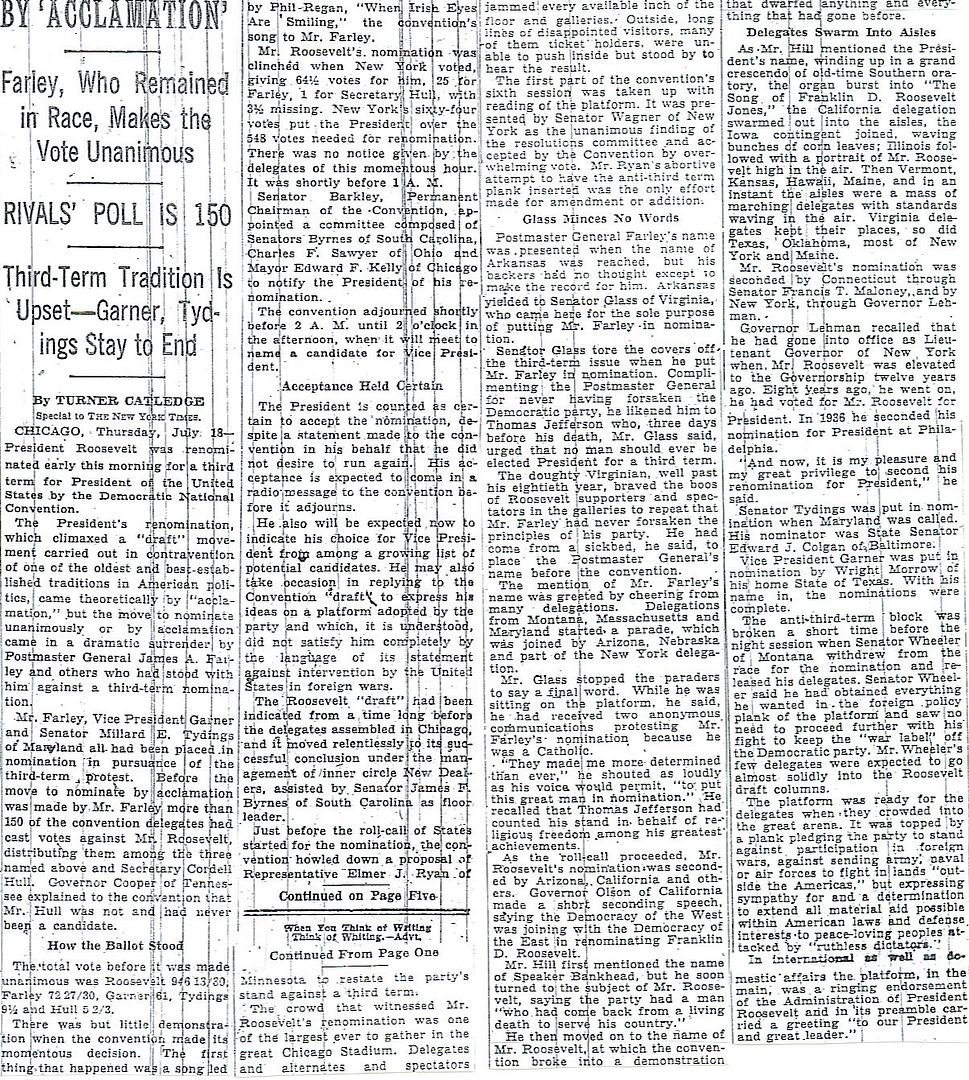




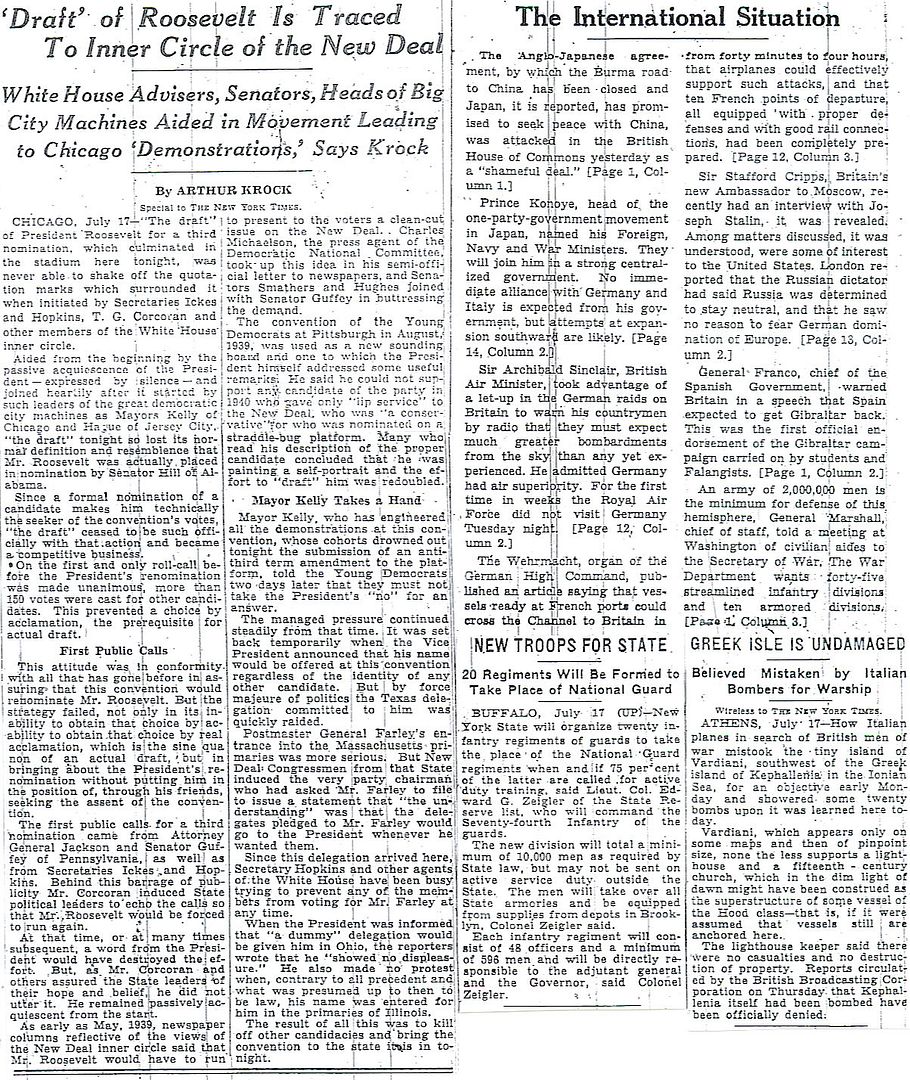

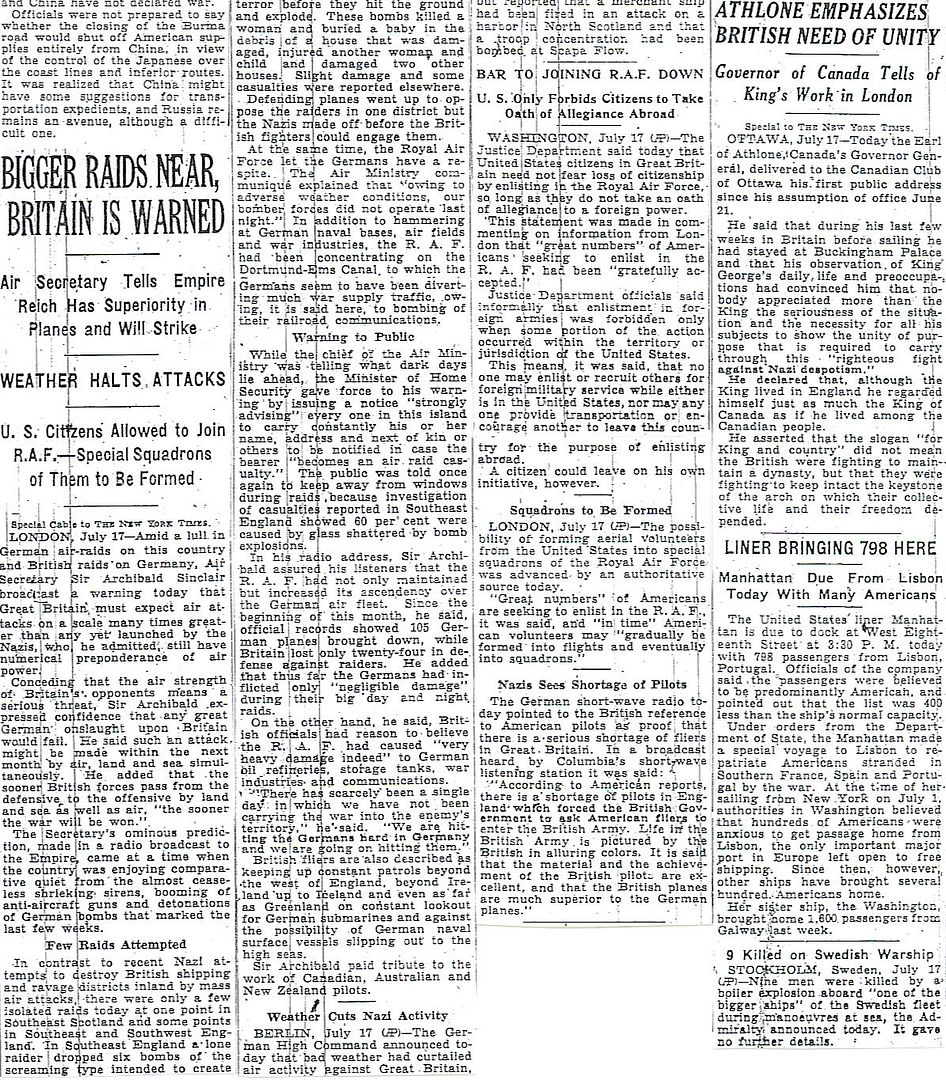
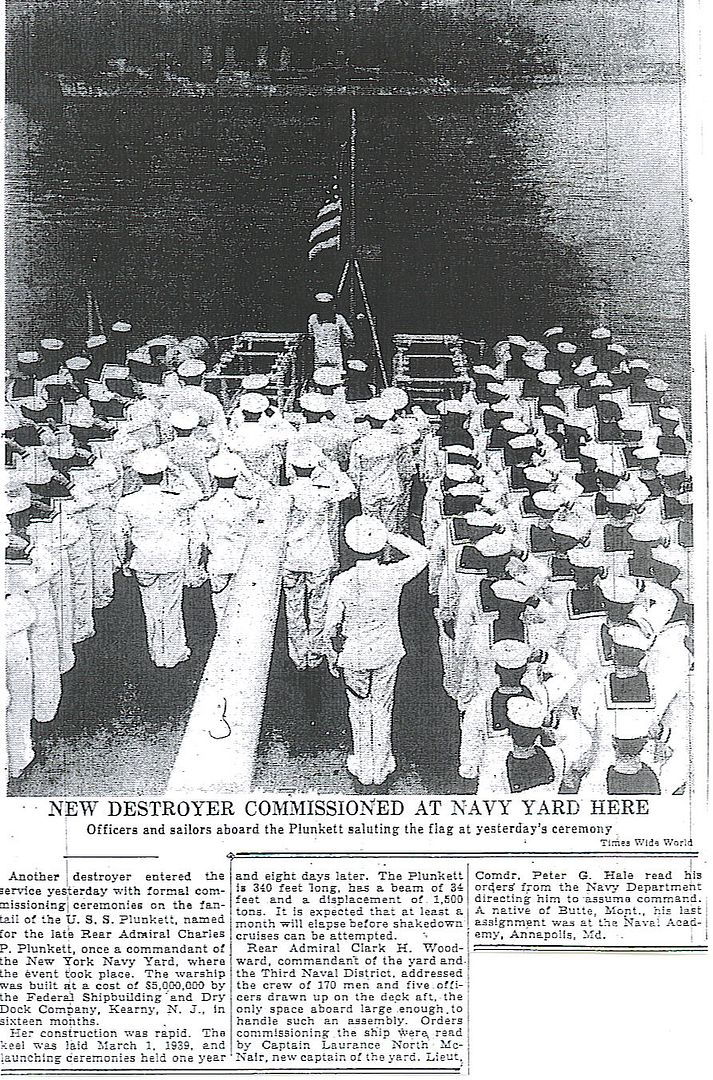



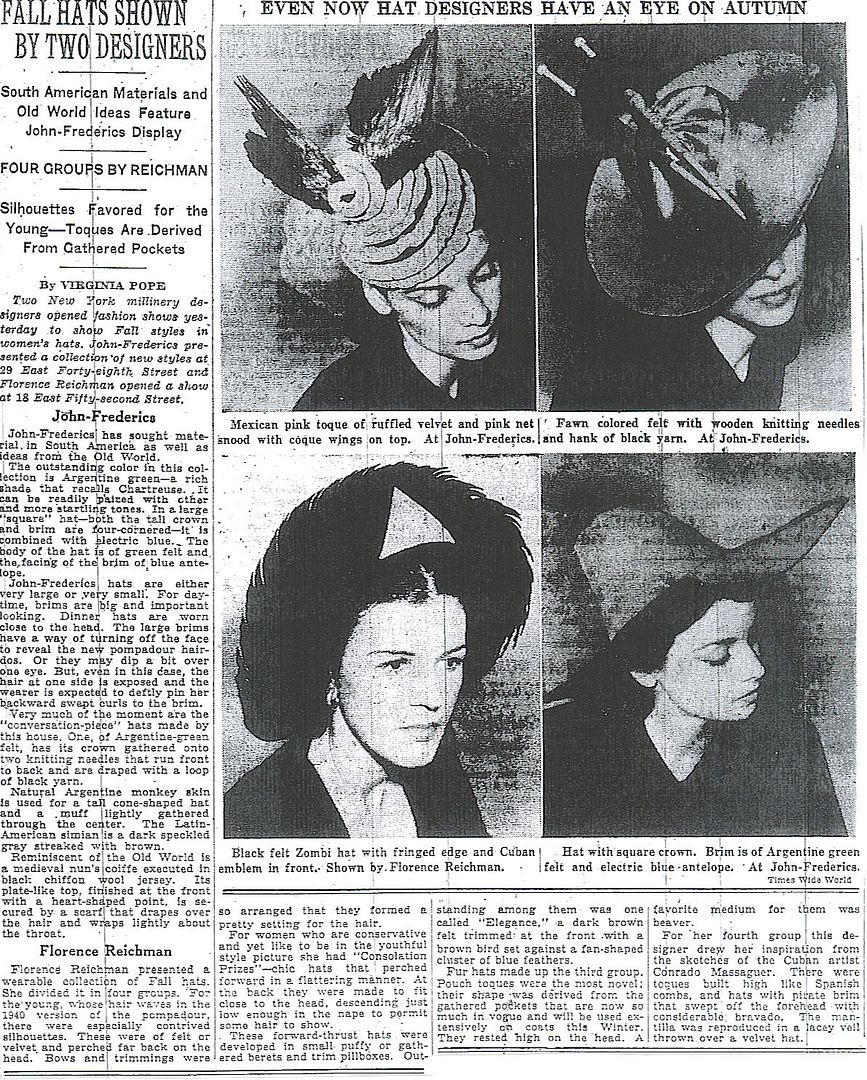
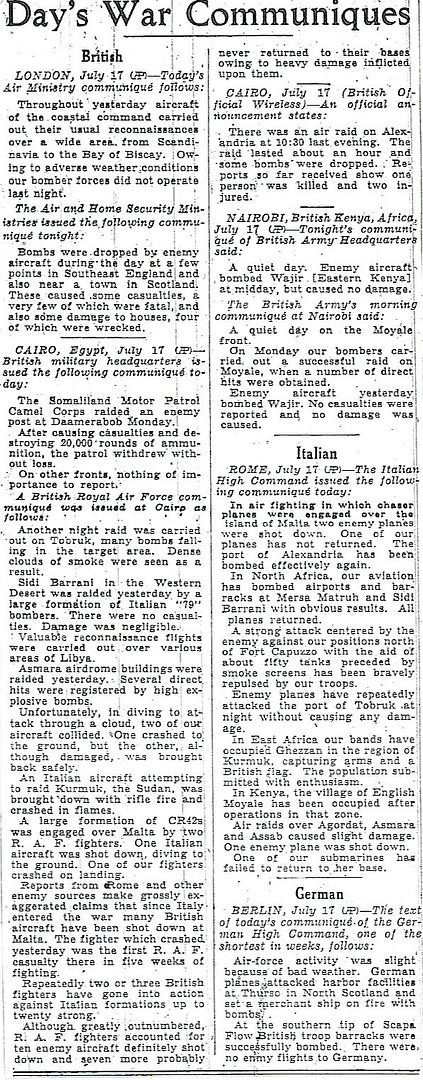
http://www.onwar.com/chrono/1940/jul40/f18jul40.htm
British close the Burma Road
Thursday, July 18, 1940 www.onwar.com
In Burma... In response to Japanese pressure and because of their present weakness, the British government closes the Burma Road to the passage of supplies to the Chinese Nationalists. The monsoon season is just beginning in Burma, so there is little real loss to the Chinese, and the road will be reopened in October when the better weather begins.
In the United States... Roosevelt is nominated as the Democratic Party’s presidential candidate without any real opposition. Henry Wallace is chose to run for vice-president.
http://homepage.ntlworld.com/andrew.etherington/month/thismonth/18.htm
July 18th, 1940
UNITED KINGDOM: London: In a bid to reduce tension in the Far East, Britain has bowed to Japanese demands and agreed to close the 726-mile Burma Road to China for a three-month period. The decision stops the flow of arms, ammunition, petrol, lorries and railway materials, to the Nationalist Chinese, but due to the impending monsoon season this means little.
Mr Churchill told the Commons that Britain would not agree to a permanent closure as this would be to default on obligations to China. Observers say that the closure will have little real effect on the Chinese war effort as traffic is slight because of the monsoon.
RAF Bomber Command: The Dortmund-Ems canal is bombed successfully.
Destroyer HMS Cotswold launched.
Minesweeper HMS Polruan launched. (Dave Shirlaw)
GERMANY: “Radio Caledonia” starts broadcasting to Britain, urging Scottish separatism.
U-95 is launched. (Dave Shirlaw)
CANADA: HMC MTB 1-12 ordered from Canadian Power Boat Co Ltd Montreal, Province of Quebec. Later became HM MTB 332-343
Corvette HMCS Wetaskiwin (ex Banff) launched North Vancouver, British Columbia. (Dave Shirlaw)
U.S.A.: The Democratic Party’s national convention in Chicago, Illinois, nominates President Franklin D. Roosevelt for their candidate for president. If he wins, it will be an unprecedented third term in office. (Jack McKillop)
ATLANTIC OCEAN:
At 1641, the unescorted Gyda was torpedoed and sunk by U-58 NW of Ireland. The ship had stopped by Loch Swilly due to an engine defect and continued her voyage on 18 July with a Sunderland flying boat as escort. The torpedo struck close to the bridge on the starboard side, opening the side, destroying the radio room and blowing away a half of the bridge. The vessel sank within one minute with the engines still running. The master and ten crewmembers were lost. Three men were thrown overboard and were later picked up by six men, which had left the ship on a raft aft of the ship. The survivors were picked up the next morning by the Ville d’Arlon and taken to New York on 26 July.
SS Woodbury sunk by U-99 at 50.46N, 13.56W. (Dave Shirlaw)
http://worldwar2daybyday.blogspot.com/
Day 322 July 18, 1940
Battle of Britain Day 9. Weather improves and Germans attack the Channel ports. 15 Spitfires of 152 and 610 Squadron engage 30 Messerschmitts off Beachey Head on the South coast of England (1 Spitfire lost). Germans bomb Montrose Aerodrome, on the East coast of Scotland (2 killed, 3 wounded). Further South, Germans bombers sink the East Goodwin Light Vessel. At 7 PM, 18 Blenheim bombers escorted by 24 fighters bomb German barges, assembling for the invasion of Britain, at dock in Boulogne, France.
French bomb Gibraltar in retaliation for attacks on French warships in Operation Catapault. French pilots drop most of their bombs in the sea, apparently having no animosity towards the British.
British cruiser HMS Cumberland leaves Simonstown, near Cape Town, South Africa looking for German armed merchant cruiser Thor, 2000 miles away off the coast of Brazil.
At 2 AM, U-99 sinks British steamer Woodbury (5500 tons of canned meat & wheat, 2500 tons of general cargo) 150 miles Southwest of Ireland. All 35 crew reach Ireland in lifeboats on 19 July. http://www.uboat.net/allies/merchants/ships/431.html
At 4.41 PM, U-58 sinks Norwegian steamer Gyda (1980 tons of salt) 30 miles Northwest of Ireland (11 crew lost. 9 survivors will be picked up next day by Belgian passenger ship Ville d´Arlon and landed at New York on 26 July.
FDR = lying bastardd ‘Rat.
Worse than Woodrow “he kept us out of war” Wilson.
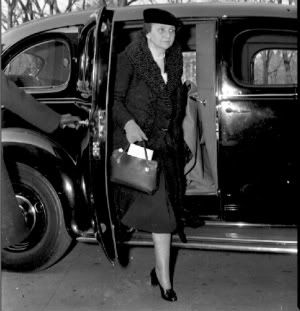
A loyal Roosevelt supporter
"Controversy in the committee centered on the phrasing of the foreign relations plank, which as finally submitted was strictly non-interventionist, calling for non-participation in foreign wars and expanding the recent pledge of President Roosevelt not to send troops to fight in Europe by a definite declaration against sending the military, naval or air forces to fight in foreign lands outside of America, except in case of attack."
That's a big exception, of course, and one which will increasingly draw FDR's attention. How big, exactly, does such an attack have to be?
"Contract Is Signed for Big Powder Plant In Indiana to Produce 200,000 Pounds a Day – 5"
Another reminder that the US was no better prepared for a total world war in 1940 than we are today.
"Army of 2,000,000 a Minimum Need, Marshall Insists – 6"
In all, about 16 million ended up serving in uniform, from a population then around 120 million.
In today's terms, that would be around 40 million in uniform.
How many more worked in war related industries?
All told, just about everyone, down to the housewives' Victory Gardens and charitable drives.
Date: 18 July 1940

Enemy action by day
Less activity centred on attacks on shipping but at 0930 hours a force of some 30 aircraft assembled behind Calais and flew towards Deal. An attack on a convoy did not develop. One fighter squadron was operating off Deal and two other squadrons were patrolling nearby as reserves. Interception took place under cloudy conditions. No enemy aircraft was brought down, but a Spitfire of No. 610 Squadron is missing. Enemy aircraft bombed a coastguard station and sank the East Goodwin Light Vessel.
South and South-West
Between 0740 and 0830 hours, 4 raids crossed the coast between Portland Bill and Bournemouth, penetrating inland to railway junctions at Castle Cary and Bruton (Somerset), Netheravon, Upavon, Abingdon and Upper Heyford. Two of these raids returned via Ventnor and Shoreham. No bombs were dropped. At about 1145 hours a Ju88 penetrated to Bristol and Cardiff and Penarth was bombed. The aircraft was intercepted and the rear gunner is believed to have been killed. The aircraft escaped across the south coast.
At 1240 hours raids appeared off Selsey Bill and at about 1300 hours No 145 Squadron shot down a He111. Off the Isle of Wight at about 1300 hours No. 609 Squadron intercepted enemy aircraft and two Spitfires are reported as casualties, but the pilots are safe. Further raids were plotted, of which one crossed the coast towards Bristol at about 1715 hours.
Bombs were dropped at Alverstoke (Gosport) and near Ringwood and Newport, but no damage was caused. At St Atham's [?] Aerodrome, however, minor damage and casualties occurred, also at Burnham-on-Sea and Axbridge. At St Atham's [?] one fatal, three serious and several minor casualties took place.
A Heinkel 111 was reported to be brought down near Christchurch, but the report so far lacks confirmation.
South-East Coast
No. 111 Squadron probably brought down one Henschel 126 over the Channel at about 1520 hours.
East Coast
Shipping reconnaissance took place off the East Coast and fifteen enemy aircraft were reported east of Bawdsey at about 1500 hours. There unconfirmed reports of dive-bombing on trawlers.
Scotland
At 0942 hours a Heinkel 111 bombed Montrose Aerodrome, diving as low as 500 feet. Some aircraft received slight splinter damage and five casualties, two fatal, were suffered by RAF personnel. Montrose was bombed at 1030 hours.
Between 1300 and 1800 hours four raids appeared off north-east Scottish coasts while activity was increase up to 2100 hours. A convoy was continuously attacked and minelaying in its vicinity is suspected. No reports have been received of damage to convoy, but Anstruther RDF Station was bombed and the nearby coastal town of Crail (South of Fifeness). No interceptions were made.
Patrols
Twenty-four fighters escorted 18 Blenheims on a raid on Boulogne between 1900 and 1912 hours, and report no enemy aircraft was seen.
By night
Enemy activity began at about 2350 hours and was directed mainly North of a line Humber to Liverpool. Ten to twelve raids at least were plotted in this area. Several crossed the coast proceeding westward and fading off the West coast. Minelaying is suspected off Cumberland, Westmoreland and Lancashire as far south as Liverpool. Several of the raids were picked up returning eastwards.
Belfast was given the Yellow warning on account of one raid traced across from the East coast to the West to St Abb's Head where it faded but was later picked up off West Belfast Lough at about 0105 hours proceeding north-west, and again picked up in about the same position flying south-east at about 0130 hours. Some raids did not cross the coast and minelaying is suspected off the Yorkshire coast and Southwards. There was some activity at about 0030 hours in the Straits of Dover and along the coast of Norfolk and Suffolk, one raid going inland as far as Kings Lynn. Very little activity was reported from the South Coast and no reports have been received.

________________________________________
Statistics
Fighter Command Serviceable Aircraft as at 0900 hours, 18 July 1940
Casualties:
Patrols:
Balloons:
Aerodromes:
Organisation:
Air Intelligence Reports
Home Security Reports
So you’re saying that we should have stayed out of the war after Pearl Harbor?
I’m saying that FDR was lying when he said “I hate war. Elonor hates war. I have told you once and I will tell you again—your boys will not be sent into any foreign wars.”
I think all along FDR knew we were going to get into the war. But I think he said that knowing two things: First, at the time, the mood of the country was isolationist, and FDR knew that he would probably not get re-elected if he was perceived as wanting the US to get into the war. Second, even if FDR wanted to get the US into the war, we were not close to being ready to go to war, so he knew he needed to buy time to get us ready.
Plunkett
Charles Peshall Plunkett, born in Washington, D.C., 15 February 1864, was appointed to the Naval Academy in 1879. A veteran of the Spanish-American War, during which he served in Adm. Dewey’s Squadron at Manila Bay, he had commanded both North Dakota and South Dakota and had served as Director, Target Practice and Engineering Competitions for the Navy Department before the United States entered World War I. In July, 1918, he assumed command of the 5 Naval Railway Batteries in France. Under his direction those mobile units of 14” battleship guns supported French and American armies from 6 September until the Armistice. Awarded the Distinguished Service Medal for his service during the war, he later commanded Destroyers, US Atlantic Fleet, and served as Chief of Staff, Naval War College; President, Board of Inspection and Survey; and as Commandant, New York Navy Yard and the 3d Naval District. Retiring in 1928, Rear Admiral Plunkett died, in Washington, D.C., 24 March 1931.
(DD–431: dp. 2,060 (f.); l. 348’1”; b. 36’1”; dr. 17’5”; s. 35 k.; cpl. 208; a. 4 5”, 2 1.1”, 4 40mm., 2 20mm., 5 21” tt., 6 dcp., 2 dct.; cl. Gleaves)
Plunkett (DD–431) was laid down 1 March 1939 by the Federal Shipbuilding and Dry Dock Co., Kearny, N.J.; launched 7 March 1940; sponsored by Mrs. Charles P. Plunkett, widow of Rear Admiral Plunkett; and commissioned 17 July 1940, Lt. Comdr. P. G. Hale in command.
Prior to 7 December 1941, Plunkett operated in the Western Atlantic and in the Gulf-Caribbean area on Neutrality Patrol. Initially in the latter area, she joined other Neutrality Patrol vessels off Tampico to prevent the departure of several German steamers, then cruised off Martinique, French Antilles to prevent the dispatching of warships, equipment, and gold to the Vichy government. Patrol and convoy missions in the North Atlantic followed, and, on 7 December 1941, she was enroute from Reykjavik to Argentia.
Plunkett continued such duty until joining TF 39 on 20 March 1942. Six days later she departed the east coast for Scapa Flow and arrived in the Orkneys 4 April to commence operations with the British Home Fleet. Employed on North Sea patrols and escort work over the first leg of the Murmansk run, she was relieved, by Mayrant, in mid-May and assigned to escort New York back to the United States. Coastwise and Caribbean escort duty followed and in August she returned to the North Atlantic to accompany U.K. bound convoys. On 2 November, she departed New York on her first escort run to North Africa. Delayed enroute to allow time for the clearance of wreckage from her port of destination, her group delivered its charges with their reinforcement troops and equipment to Casablanca on the 18th. Then, after patrolling off the Moroccan coast, she returned to New York and local operations off southern New England.
Another transatlantic convoy to Casablanca preceded shore bombardment exercises in Chesapeake Bay, after which she escorted coastal convoys until May, 1943. On the 10th she sailed for Oran, Algeria, with TF 60; and, between the end of May and July, she was employed on HUK, ASW, and convoy escort assignments in North African waters.
On 6 July, she cleared Mers-el-Kebir as a unit of the Western Task Force for the invasion of Sicily. During the invasion, she screened the merchant ships and minelayers of TG 80.5, then patrolled off the Gela anchorage and covered minelaying operations. On the 12th, she departed the assault area, returning on the 17th, to Scogletti, and on the 31st, to Palermo, with convoys. During August, she participated in numerous landings on the Sicilian coast and, in September, joined TG 81.6 to screen the transports and landing craft for the assault on the Axis boot at Salerno. Early on the morning of 13 September, she aided bombed and burning British hospitalship Newfoundland. The struggle to save the ship continued for over 36 hours, but, in the evening of the 14th, Plunkett, on orders, fired on and sank the hulk.
North Africa-Naples convoys, interspersed with fire support missions, continued until 21 January 1944, when she sailed to escort the follow up assault group to Cape Anzio. After delivering the craft, she remained in the area to screen the transports. On the 24th she fell victim to one of the numerous air attacks which, previously, she had helped to drive off. At 1738 condition red was sounded. A few minutes later the attack was launched with 2 glider bombs coming in on the port beam, and 2 Ju.88’s closing in from up ahead. Speed was increased; maneuvering was radical. The glider bombs finally dropped, at 200 yards distance, but more planes had joined the foray to commence a sustained 17 minute battle. It ended at 1757 as Plunkett took a 250kg. bomb and caught fire. The bomb killed 23, left 28 missing, with as many, and more, wounded, and caused extensive damage to her fire control apparatus, armament, and port engine. By 1821, all fires were out and the destroyer proceeded, on one engine, to Palermo. Temporary repairs enabled her to reach Casablanca and, finally, New York, where repairs were completed.
On 5 May 1944, she again departed New York for European waters. Arriving at Belfast on the 14th, she remained until 3 June, then sailed toward the English Channel to join the armada staging for the invasion of France. On 6 June, she screened the transports off Omaha beach. Fire support and patrol duties followed until the 9th, when she sailed back to England. Returning to the French coast a few days later, she added shore bombardment to her duties.
In July, Plunkett returned to the Mediterranean to prepare for another assault landing, and on 13 August, she sailed from Naples to support operation “Dragoon”, the invasion of southern France. During that operation she carried officials to and from the beaches in addition to performing her screening duties. She next added fire support and shore bombardment off St. Topez, Port de Bouc, and Marseilles to her mission, and continued those duties, particularly on the Italian-French border, until 23 November. She then sailed for Oran, whence she escorted a convoy back to the United States, arriving at New York, 16 January 1945.
Plunkett engaged in training exercises, ASW patrols, and experimental testing until early May, when she resumed transatlantic escort work. The war in Europe ended before she reached the U.K., but hostilities in the Pacific still raged. On 27 May, she returned to the east coast, underwent extensive alterations and refresher training, and got underway for the Pacific 6 August. She transited the Panama Canal 13 August and was enroute to San Diego the day the war ended. In September she escorted occupation forces from the U.S. to Japan; then, in October and November, assisted in ferrying more from the Philippines. Later in November, she sailed northeast to the Aleutians, where she operated until ordered back to the east coast for inactivation.
Plunkett decommissioned 3 May 1946 and was berthed at Charleston as a unit of the Atlantic Reserve Fleet. She remained there until reactivated and transferred, under the loan provisions of the Military Assistance Program, to the Nationalist Chinese government, 16 February 1959. Renamed Nan Yang (DD–17), she remains with that country’s navy into 1970.
Plunkett earned five battle stars during the Second World War.
President Roosevelt was then telling the truth, the whole truth and nothing but the truth, so help him, God.
The problem is that many people, then as now, "can't handle the truth," and so understood FDR to say something other than what he meant.
What he meant, and what he said to those around him was: if we are attacked, then it is no longer a "foreign war."
This is made 100% clear and plain in the Democrat party platform reported on "today".
So go back and read it.
There's no mystery here.
FDR said what he meant and meant what he said.
If you don't want to understand it, that's your problem, not his.
I hated FDR’s domestic policies, but he was damn good wartime President.
Were these the right thing to do? Maybe so, but the reason he did what he did, in the deceitful manner he employed was that Americans did NOT want to go to war — and FDR did.
That German chemist story is intriguing. A cursory search didn’t turn anything else up on the man. It would be neat to find some more details as to what was going on here.
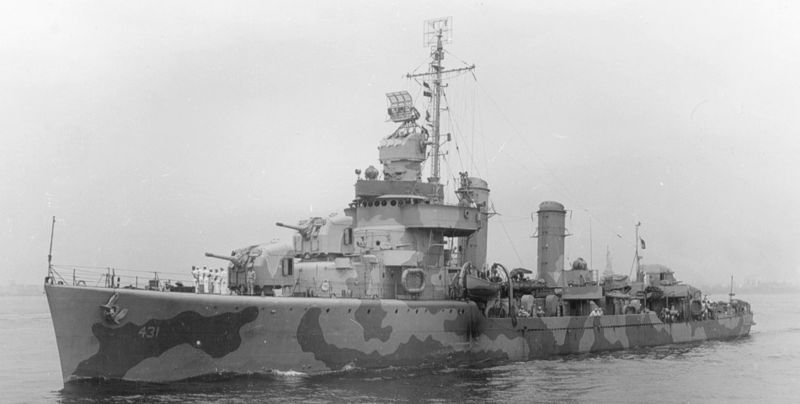
I note her service transporting US troops from the Philippines to Japan in October-November 1945.
Disclaimer: Opinions posted on Free Republic are those of the individual posters and do not necessarily represent the opinion of Free Republic or its management. All materials posted herein are protected by copyright law and the exemption for fair use of copyrighted works.